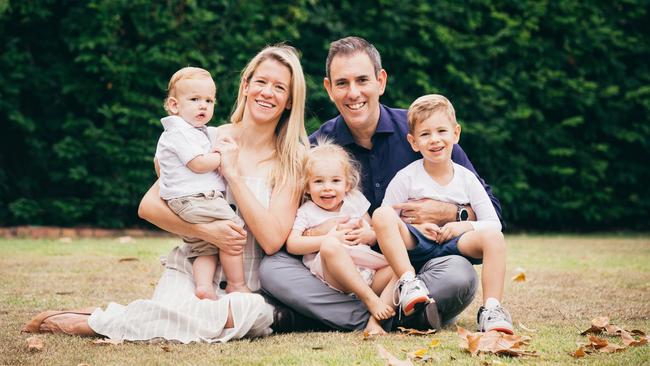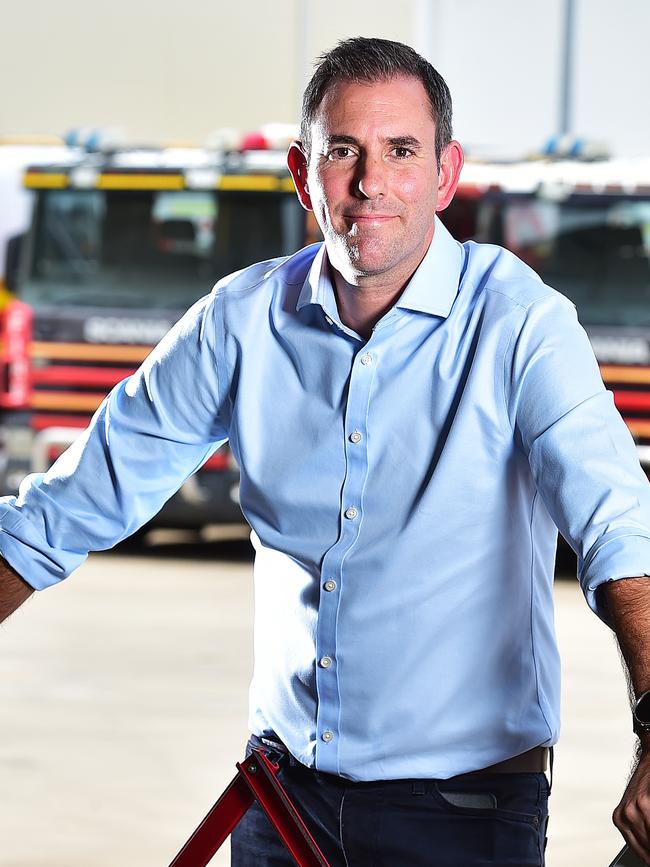
Obviously, that’s a privilege afforded in practice only to voters in the federal seat of Rankin in Queensland that he comfortably holds.
But were Chalmers to assume the leadership of the Labor Party, would you be more likely to cast your vote for a Labor candidate at the next federal election?
And wait, haven’t you read something along these lines before? Yes, last week, Inquirer wanted to know if you could see yourself backing Labor with Tanya Plibersek at the helm. Anthony Albanese’s position has become a little less stable, even since then. How do we know? Well, he spent the week sandbagging it. That’s usually a good sign.
Also, Plibersek is barely hiding her ambition. And good for her. She’s 51 now, she’s extremely experienced, having been in government and opposition; her children are older — one has finished high school — and she looks and probably feels more confident and ready than she has ever felt in her life.
Some of the 1000 comments left on last week’s story suggest that Inquirer’s readership is not entirely convinced, however.
“No way, never ever,” was how one reader put it.
“In one word: no.”
“Why are you asking us? Why don’t you go and ask some Guardian readers? She might appeal to them.” Well, exactly.
Which is why there is no point asking Guardian readers. They are already voting Labor or, more likely, Green.
And while Labor certainly needs to win back some newly Green voters, it much more urgently needs to find a way to encourage tens of thousands of middle-of-the-road Australians to vote for it instead of the Coalition.
If Albo is seen as too far to the left, is Plibersek really the answer?
Some say no. But Chalmers might be.
Now, if you’re not from Brisbane, you can be forgiven for not knowing that much about him. Here’s a quick CV:
Chalmers is part of the new generation of Labor politicians born after the Dismissal. (He’s 42.)
You couldn’t script a better family background for a Labor man: his father, Graham, worked as a courier and his mother, Carol, was a nurse.
He attended Catholic schools but says he’s more “tribal than Bible”. He is married and has three kids, and if you were thinking that he seemed to be keeping his head down this week, well, he got one off to childcare, one off to kinder and one off to school, and probably needed a lie-down after that.
His seat of Rankin covers parts of Brisbane, and parts of Logan which, as everyone likes to remind him, rhymes with bogan.
Logan has twice won Facebook’s “Sh%T Towns of Australia” competition.
Chalmers not only grew up around there, he still lives there. And he likes it. And if he runs for the leadership, he’s going to tell his story from there. It’s a familiar story to anyone with Labor in their family background.
Chalmers is one of those people who believes that, yes, Australia is doing well economically, certainly better than the rest of the world, but so it should. It’s the best country on earth.
He believes passionately in social mobility, too. How do we make sure that people can be upwardly mobile, even if they are from suburbs such as Logan, or Broadmeadows?
How do we encourage the idea that success stories can come from anywhere? How do we avoid becoming a nation with a stagnant national story, where success comes only from a diminishing pool of people born with obvious advantages?
He is aspirational not only for the people doing it toughest but for the millions who feel as if they are working their bums off and just can’t seem to get ahead.
One criticism that comes up when he sets out this vision is: well, what would he know about the real world? He went from university to a job in a pollie’s office to preselection to the House of Representatives.
If that isn’t Canberra bubblish enough for you, he is married to a journalist, Laura Anderson, whom he met when he was working for Wayne Swan and she was working for Julia Gillard.
Swan and Gillard attended their wedding in 2013. Apparently the seating plan at the reception had to be altered to keep the peace between guests.

Chalmers’s other problem is that he has what might be the worst job in politics right now: as opposition Treasury spokesman, he shadows Josh Frydenberg. Can you even imagine?
The federal Treasurer is not only indefatigable, his job for the past 12 months has basically been to give money away.
One of the curious truths about COVID-19 is that many people in Australia are better off than they were before the pandemic.
They don’t really know anyone who got sick. They do know a lot of people who got richer.
Some young people who were earning $400 a week before the pandemic suddenly found themselves getting $750 a week from JobKeeper for doing the same hours.
People on unemployment benefits started getting the COVID-19 supplement and were like: whoopee, and went out and bought new mattresses for the bed and school supplies for the kids.
Then you’ve got those who accessed their super, and fixed the house up, or knocked a bit off the mortgage.
And you’ve got pensioners who got COVID-19 cheques and put them straight in the bank, which must feel good given they never normally get to save anything.
Frydenberg and the Morrison government are bathing in goodwill. Chalmers, by contrast, has a bit of economic baggage.
He helped Chris Bowen cook up the franking credits policy that was an absolute disaster for Labor at the federal election in 2019.
Like Plibersek, he nonetheless considered running — or “having a crack”, as he put it — for the leadership after Bill Shorten lost the election. Plibersek decided against it and so did he, for the same reason: each would have lost.
But maybe now is the hour?
Chalmers wrote a sensible opinion piece for The Australian this week. Summarised, it said: jobs, job, jobs. And that’s quite right. It’s one thing for the government to be giving out cash during a pandemic, but it’s long-term unsustainable. We are going to need jobs.
If push comes to shove, would Chalmers defeat Plibersek? She is more experienced; she feels ready; plenty of people think she deserves a go and she certainly has a bit of a charisma about her.
She is also tied to an inner-city leftist agenda. It is her biggest asset in the inner-Sydney seat she holds.
It is also her biggest political handicap in terms of national appeal. And it’s the federal government she wants to lead.





Can you see yourself voting for Jim Chalmers?